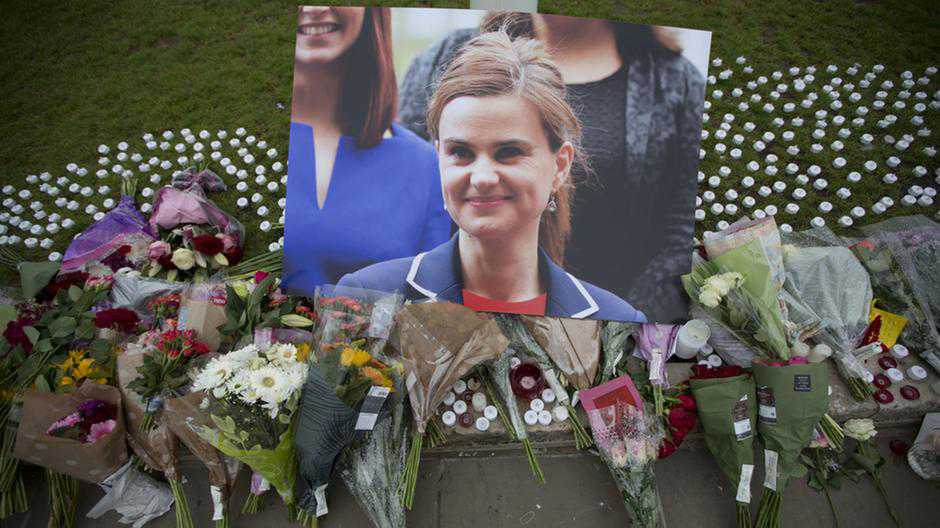Far right still a growing threat five years after UK politician Jo Cox’s murder by neo-Nazi
18 June, 2021

Five years back the murder of politician Jo Cox sent shockwaves around the world and resulted in a “watershed” moment in the manner the UK handles far-right extremism.
The mother-of-two, 41, was shot and stabbed to death by neo-Nazi fanatic Thomas Mair as she visited her constituency office in the small industrial town of Birstall, West Yorkshire, on June 16, 2016.
It was only weekly before the UK visited the polls to vote on Brexit - an issue which caused deep divisions across the country.
Ms Cox, a staunch Remain campaigner, wrote a column opposing Brexit the week before, a cutting of which was later within Mair’s home.
In court, the murderer spoke and then say "I am death to traitors, freedom for Britain" - it had been later used as a slogan by far-right group National Action, which had labelled him "a hero” because of his actions.
MP’s murder resulted in UK banning far-right group
Within months of the tragedy, National Action became the first far-right group to be proscribed in Britain and security services started taking the far-right threat more seriously.
Previously, the UK’s list of banned organisations included international terrorist groups, such as Al Qaeda and ISIS but nowadays there are five far-right groups listed.
Despite the purge, authorities say far-right extremism still poses a significant threat to the UK.
“The murder of Jo Cox was a turning point and a wake-up demand the security services to up their game,” the chairman of Muslims Against Anti-Semitism, Ghanem Nusiebeh, told The National.
“It clearly was failing. Things are changing nevertheless they aren't changing fast enough.”
Regardless of the spotlight on the far right, Britain’s counterterrorism chief said it was still the fastest-growing threat in Britain.
Metropolitan Police Assistant Commissioner Neil Basu said 10 out of 12 under-18s arrested for terrorism this past year were linked to extreme right-wing ideology.
"There's definitely been a growth in nationalistic material online, white supremacist literature, things that are extremely disturbing,” he said.
A lot more than 60 far-right activists have been sentenced for terrorist offences since 2017 and 12 were convicted last year.
Far right will stay a threat for ‘foreseeable’ future
Dr Chris Allen, of the Centre for the Analysis of the Radical Right, warned in a recently available government report that the far right would remain a threat for the near future.
The extreme right wing pose a very real threat to your domestic security
“While the relatively lot of successful convictions will probably have damaged the group, little damage will have been done to the ideology of national socialism or those that feel or express a commitment to it. The same is true of those ready to use violence to enact that same ideology.
Dr Allen said there may be no guarantee that terrorist prisoners would "undergo a volte-face".
“It's possible that some time later on those same individuals might re-emerge with techniques that seek to reaffirm or revitalise their ideological commitment," he said.
“That is why, the ideologies of the extreme right wing and those committed to them are likely to continue to pose a very real threat to your domestic security for at least the near future, regardless of how damaged National Action may or might not be.”
In the last three years, eight of the 27 serious terrorist plots prevented in the ultimate stages in Britain were associated with neo-fascist and racist groups.
Police arrest far-right gang over 3D weapons factory
Last month armed police raided homes in Keighley, West Yorkshire, yards from where in fact the gun that killed Ms Cox was stolen and charged a gang with making 3D weapons and running far-right extremist sites on social media platform Telegram.
The area has long been a hotbed for Islamist and far-right extremism.
The ringleader of the July 2005 London tube bombings, Mohammad Sidique Khan, lived in Batley, as did Terence Gavan, a bus driver and person in far-right political group the British National Party who was simply jailed for 11 years for assembling an armoury in his bedroom, including nail bombs and a booby-trapped cigarette packet.
When police raided Mair’s home after Ms Cox’s murder they found out a collection of books on the Nazis, German military history and white supremacy on a bookshelf topped by a gold-coloured Third Reich eagle with a swastika.
It was later revealed he previously attended a BNP event in London.
Facebook banned the BNP - which was once located in Keighley - in 2019, forcing it to use less popular social media platforms.
Dr Paul Stott, a research fellow at the Centre for the Response to Radicalisation and Terrorism at the Henry Jackson Society, told The National that although far-right groups were losing support they were becoming more extreme.
“The legacy of Jo Cox in a way is that the British far right have continued to carry on becoming smaller and smaller and smaller and more isolated and more extreme,” he said.
“This is a classic case of terrorism being truly a sign of weakness rather than strength.
Source: www.thenationalnews.com
